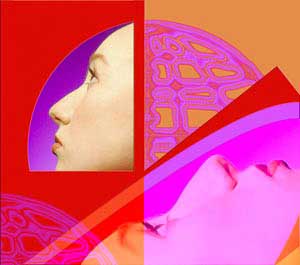| I am today’s Indian woman.
I was born in India, but grew up in the United States. I was raised in the typical split environment, torn by cultures old and new. At home, the focus was entirely on heritage and religion; at school, I was exposed to the more liberal American society.
While America was fascinating and I was voraciously adapting to life in the United States, I always felt different. No matter how adept I became speaking American accented English while still comprehending the accent of my elders; regardless of the acceptance of girlfriends I made in school, I still felt extremely different. My new Westernized lifestyle fit me like a second skin. I was not a true American in my mind. I was taught different values at home – not necessarily superior, in my mind – just different. I was amazed at their hypocrisy after everything that I grew up hearing. “Maintain your heritage, live in the U.S. as if you are in your birth homeland, cling passionately to the Old World and never betray that culture by becoming fully Americanized” was their constant refrain. I could not comprehend why they were all was formalizing their identities as U.S. citizens after chiding me anytime I “strayed” from the Indian path. So I retained my Indian citizenship. It was for me, personally, the last shred of the first stamp of my image and it gave me my identity. I knew who I was originally, even though I discovered I wasn’t really “Indian” every time I visited the country. Nevertheless, I remained convinced that I was a true Indian, true to my roots, my principles. I came to understand, however, that U.S. citizenship for many Indians acquiring it, merely meant convenience, avoiding logistical nightmares, made sense if one never planned on returning to reside in his birthplace, etc. However, I vigilantly retained my original nationality. I should not require a visa – permission – to enter a country in which I was born. My interest in the subject revived recently after I learnt about India’s introduction of dual citizenship, which would provide a balance and perhaps a clearer depiction of identities for those born elsewhere, but who choose to live in another land, often thousands of miles away. Dual nationality sounds simple enough: a person with citizenship in two countries simultaneously. U.S. law does not specifically mention dual citizenship. One is not required to choose one citizenship over another and an individual granted another citizenship does not risk losing U.S. citizenship. However the issue is more complex. The Immigration and Nationality Act (INA) defines “citizenship” and “nationality.” All U.S. citizens are U.S. nationals; however, not all U.S. nationals are US citizens. A U.S. national may be a person who, though not a U.S. citizen, owes permanent allegiance to the United States. It can easily become a legal eagle’s dream discussion, both legally and philosophically.
How many dual citizens are there? No one knows, because no one keeps track. We do know, however, that countries are increasingly allowing U.S. citizens to reclaim their heritage, in a sense, by applying for dual citizenship even while maintaining their U.S. citizenship. It affords such citizens the best of both worlds – flexibility to travel, a sense of history and the ability to have some of the rights of local residents without actually being one, with considerable financial advantages. USA Today recently reported that countries such as Ireland, Germany, Israel, and Mexico have all experienced a spurt in Americans seeking dual citizenship. An estimated 20 million immigrants acquired U.S. citizenship in the past century. Theoretically, the majority of them retained their original citizenship, even if they didn’t want it or use it. The motivations of those who take out U.S. citizenship and those who can, but don’t, vary. I recall an Indian man who, after securing his U.S. greencard, proudly vowed he would never give up his Indian citizenship – because he didn’t want to be drafted in a war. At a Korean restaurant, I got a similar dual citizenship lesson with a side of dim sum when a waiter revealed that several of his male Korean friends had renounced their dual Korean citizenship after a May 2005 law obliged them to military service. Mitul Patel, an Indian man remonstrated, however: “I’m a natural-born U.S. citizen and looking back to elementary school I recited every morning, ‘I pledge allegiance to the Flag of the United States of America and to the Republic for which it stands, one Nation under God, indivisible, with liberty and justice for all.’ I pledged allegiance only to the U.S. and not to other countries as well. My loyalties are with the U.S. despite the fact that my parents are not natives of this land. Those who immigrate to the U.S. do it for one reason only, because we live in a land of opportunity. I am vehemently opposed to dual citizenship.” Most Americans are similarly troubled, arguing that a citizen should be a patriot, abandon all other allegiances in exchange for the new opportunities. However, 17-year-old Sahil Mehta demurs: “Dual citizenship is not only something official anymore, but it helps define your position in any society.” Mehta believes dual citizenship opens the door to new opportunities for Indians while enabling them to remain connected to their roots and facilitates travel. |
Two-faced Identity

